Scholar Spotlight - Shane Coleman Macken

Discover more Scholar Spotlights.
Shane Coleman Macken, a Laidlaw Scholar at Trinity College Dublin, on challenging social perceptions of queerness and taking research beyond the realm of academia.
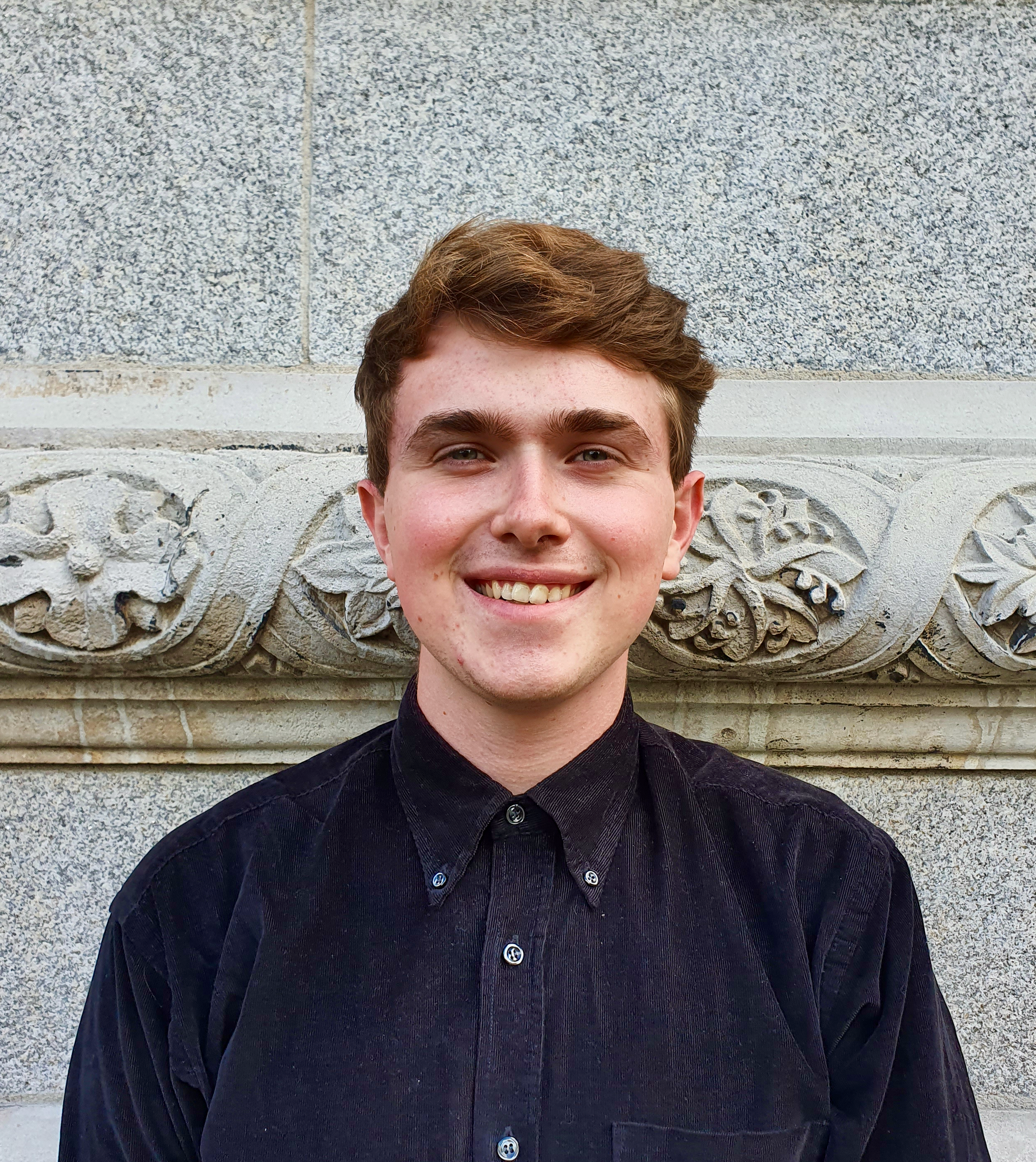
When the AIDS crisis swept across the US in the 1980s, it was deemed the ‘homosexual cancer’. This prompted vilification of queer communities and extreme neglect of the disease because it affected a marginalized group outside of heteronormative society. Queer people channelled their frustration and deep upset into various art forms as they watched their friends die. Drama became one of the most provocative ways to convey this struggle - it allowed for an active performance of sexuality and suffering.
My research centres around the deconstruction of a homogenized queer identity in a groundbreaking play written in the aftermath of the AIDS crisis: Tony Kushner’s 1991 Angels in America. In a time when gay men were collectively identified in order to stigmatize, Angels portrays the lives of five gay men with distinct personalities, at war with one another. This sees the breakdown of the popularly conceived notions of gay men pertaining to the same personalities.
Angels procured mainstream success on Broadway, displaying a manifestation of the lethal grip of AIDS on American society, bringing an oppressed voice to wider society and sympathy to the faceless statistics ascribed to queer people across the world. Through a deep analysis of the different struggles faced by much of the queer community, Angels projected nuance and complexity to queer identity. In my work, I have come to view this as dissolving identity into queer identities.
One of the most powerful impacts arrived during the National Tour of the play. It evoked open and honest conversation about AIDS in smaller conservative areas where there was no discourse about communal struggle. My research attests to the value of art as a means of expression, and the immense power literature carries in changing the world through honest, unashamed portrayals.
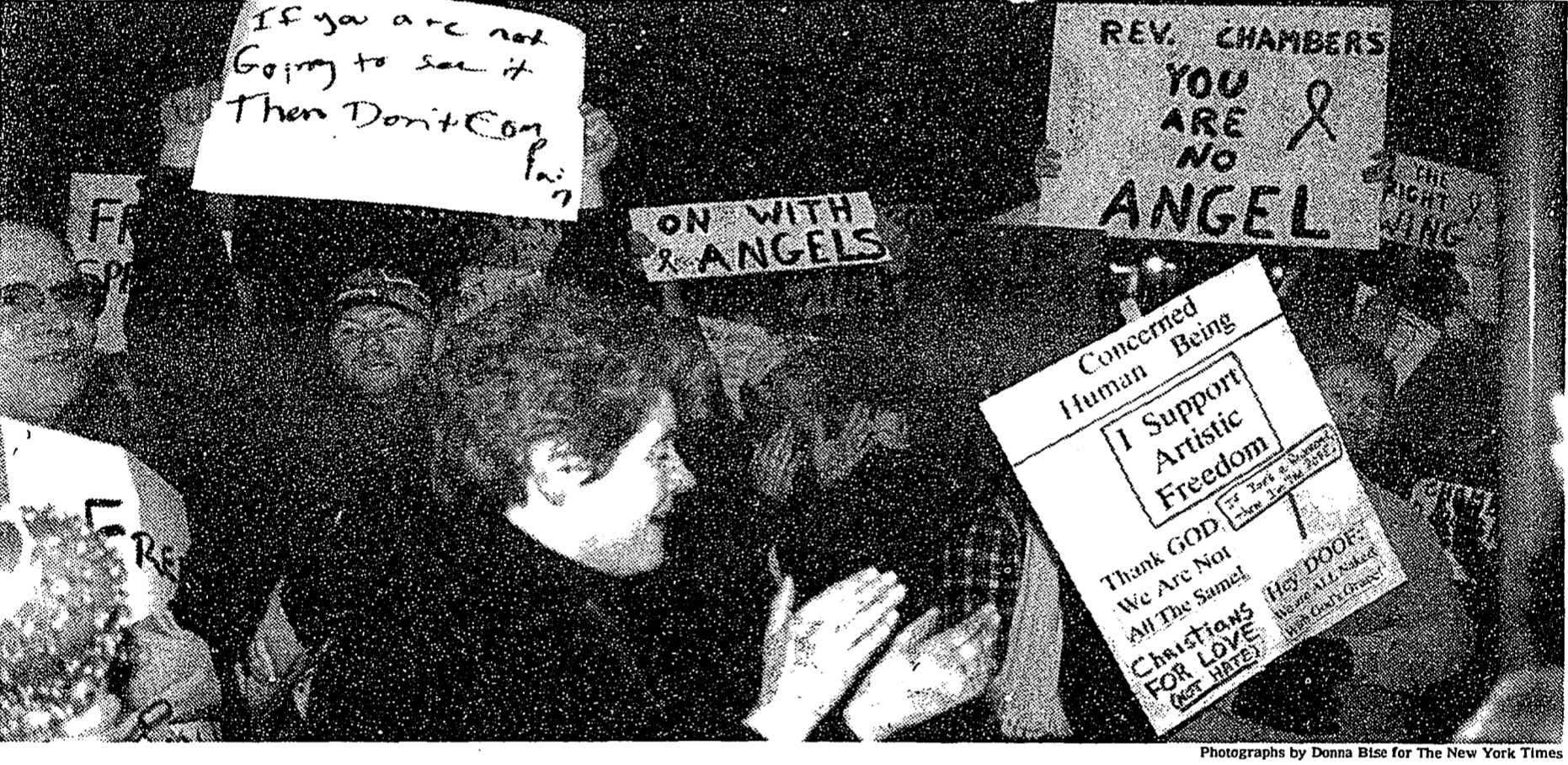
Image taken from the New York Times on 22 March 1996 showing protestors supporting a production of Angels being shown in Charlotte, North Carolina, following calls for it to be banned.
Where did your passion for this research originate?
I’ve always found literature to be the most explorative form of expression, connection and human feeling. Authors, playwrights and poets convey harsh realities and struggles of life in ways some could only dream of.
I first read Angels in America for a lecture with Dr Philip Coleman (whom I am so fortunate to have as my supervisor) on American Identities from the Harlem Renaissance to Present. I’ve never felt such an instant connection with a piece of literature. I think for me, this comes from the search for identity as a young queer person. All I could think about when reading it was Kushner’s exploration of queer identity.
The characters in the play pair up to form binary oppositions with a lot of arguing and confrontation, something I really admire Kushner for. While he portrays gay people fighting against a common struggle, he effortlessly conveys their individuality on a micro-level. When I was in school, queer people were painted with the same brush. Your only personality trait was ‘gay’. Angels really spoke to this. I asked myself why queerness became vilified/othered through years of oppression. For me, this project acted as a means to understand how these ideas began to change, even if the fight is still not over. I wanted to use this project to detail the importance of challenging social perceptions of queerness and understanding how these can be broken down.
What is the most memorable moment from your Laidlaw scholarship experience so far?
It's really hard to break it down into one experience! It has been such a pleasure to work on this phenomenal opportunity in the middle of the COVID-19 pandemic because I found a sense of purpose in my work with Laidlaw. I was actively engaged in research and issues I was passionate about, which was a saviour for me after prolonged isolation.
My research period also allowed me to reflect on myself in working with the materials and the support I was so lucky to have. I was able to explore my own identity and comfort with my sexuality in ways I never thought I would.
However, a true highlight is the connections I’ve formed with fellow scholars. We have fostered a great research and support community amongst the TCD Arts and Humanities scholars in my cohort. I never thought it was possible to meet anyone when so isolated, so Laidlaw has been a wonderful opportunity to meet fantastic people.
What is the biggest challenge you came across in your research and leadership journeys so far, and what did you learn from it?
Is it too predictable to say COVID-19? My initial proposal for my Leadership-in-Action this summer looked very different to what is still permissible in summer 2021. Having been in contact with an academic at the University of South Carolina, I wanted to travel from Ireland to the US to work with a local theatre group to produce an academic workshop on Angels in America. Travelling so far and putting on a production feels like a utopian dream right now.
So, what did I learn from this? Whatever you do, do not be resistant to change. Adaptivity is one of if not the most fundamental traits a leader can possess. Furthermore, it is important not to let setbacks such as this get you down. When facing challenges like this, they force us to be creative and get innovative. I am so excited for what is to come this summer - working with the International Dublin Gay Theatre Festival to put my research into practice and help produce communal resources for the Irish queer community during the age of online activity and social distance. While starkly different to my first plan, it is the product of adaptability.
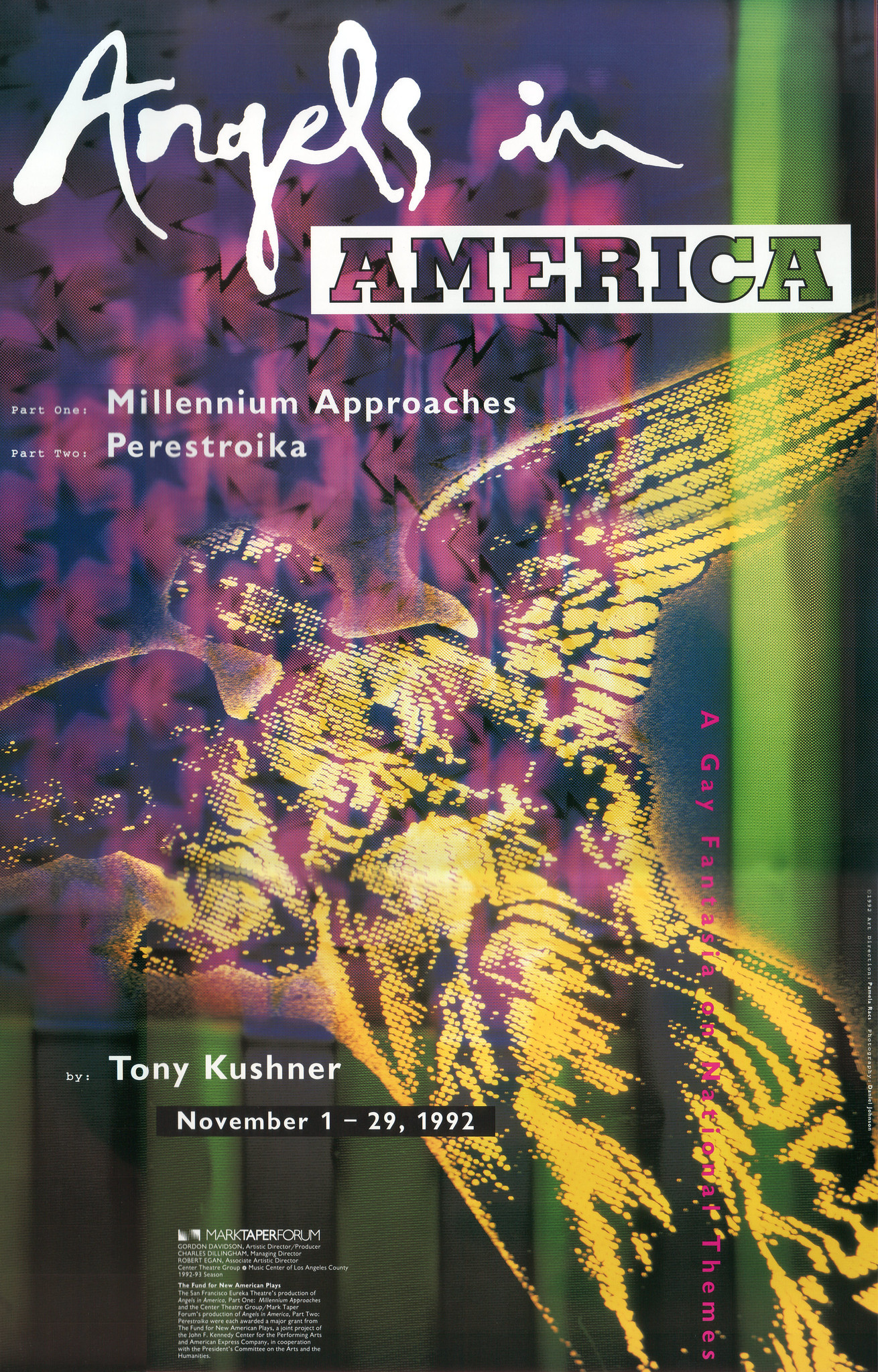
What does it mean for you to be a Laidlaw Scholar?
I think being a Laidlaw Scholar means taking your research beyond the realm of academia. We tend to associate research with dusty, windowless archives, libraries and convoluted papers that academics (and students desperate to beef up an essay word count the odd time) are going to read. It is often inaccessible, with countless boundaries in between it and the wider public.
Being a Laidlaw Scholar means taking your research and doing something with it. Amplifying voices, increasing social awareness, producing technological and scientific research that will march us forward to the beat of change. It means having the drive, ambition, and leadership to use your research for good. It is research for society that works in conjunction with society. It also means support, with an amazing network of past, present and future scholars to help us drive our research in the direction of the change we desire.
Which particular leaders inspire you the most and why?
I have so much respect and adoration for Jacinda Ardern. As a leader, she values the opinion of researchers across several fields and takes appropriate consideration of their work. New Zealand’s response to this pandemic never ceases to amaze me. I think she encapsulates compassion, proactivity, communication and adaptability with such ease. She stood up to the dangerous threat COVID posed from the word go and has set a precedent I believe all world leaders should follow when it comes to listening to the facts and rising to the occasion.
Briefly describe a scene from the future you are striving to create.
I would like to see a world that makes research more accessible for everyone. Right now, class is a distinct boundary for so many people. Therefore, research becomes privileged and exclusive. I would like to see a movement towards greater Open Access research without the financial burden resting on the author. COVID has shown us just how important it is to be open and honest with these principles.
Another vision for the future is better education for LGBTQIA people. HIV diagnoses in Ireland are increasing due to the closure of queer health services and the lack of adequate sexual and physical education for queer children. Queerness is still stigmatized worldwide, and work is needed to drive greater inclusion and equality. I want to aid in developing classroom resources that encourage a more honest and inclusive, less heteronormative education. It is a fundamental step.
Quick-fire Questions
📺 Currently binging: Every series of Drag Race for the billionth time…
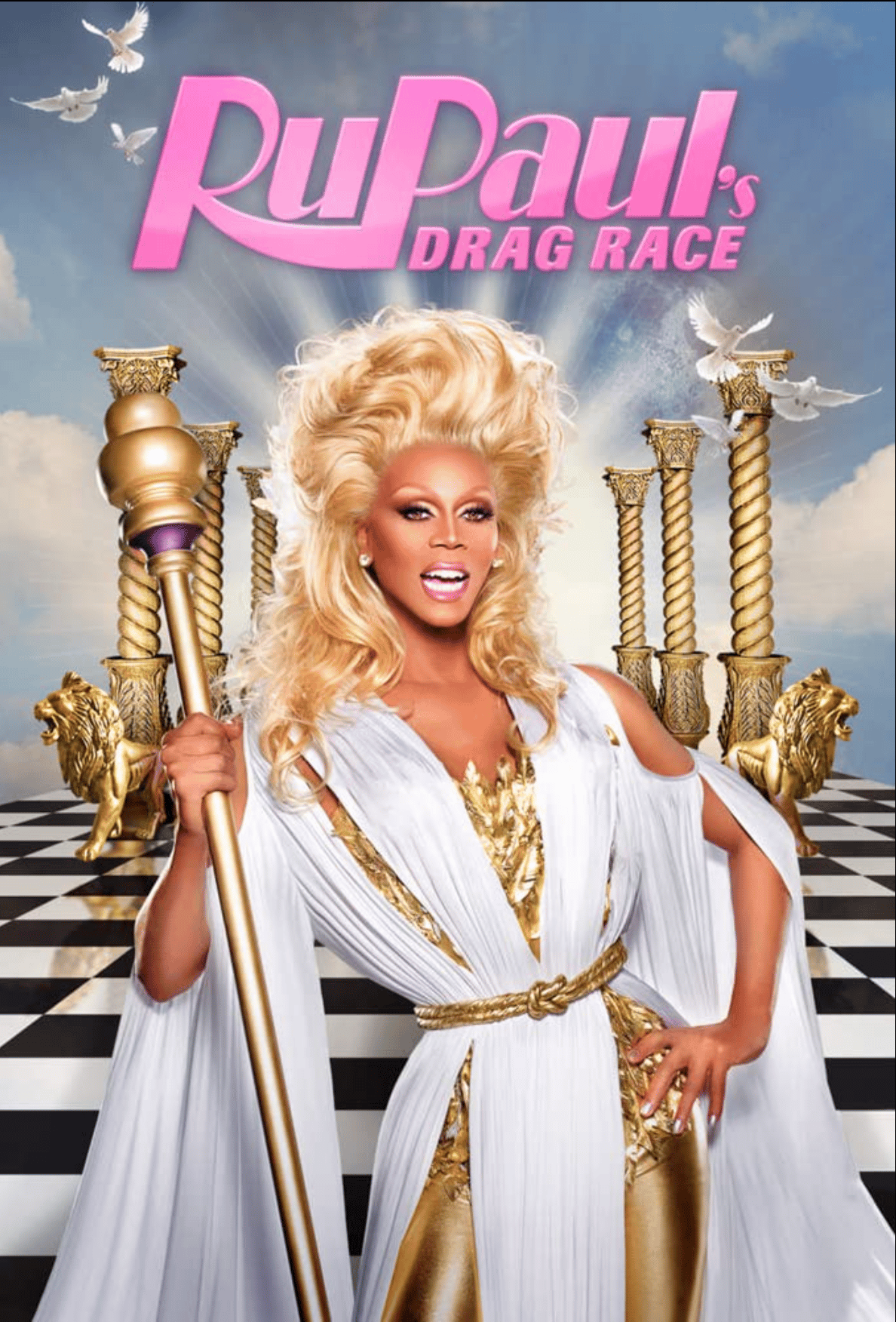
🎵 My quarantine anthem: Mr. Perfectly Fine by Taylor Swift
📚 My top book recommendation: Right now, I have to recommend Ocean Vuong’s On Earth We’re Briefly Gorgeous, but I can never give enough praise to The Picture of Dorian Gray!


🎧 Podcast obsession: I’d have to say Many Moons Ago because it’s a passion project put together by the Trinity History society I was chair of for the past year!
🌈 Something that made me feel joy recently: Meeting some of the amazing people I’ve been getting to know over Zoom for the past year and enjoying the beautiful weather in the angels in America.
Definitely be sure to check out the work of the Dublin University History Society on Twitter and Instagram! I was the chair of the society for the past year and I am so proud of all we managed to accomplish in the face of COVID restrictions. Also, check out the International Dublin Gay Theatre Festival for all the exciting work I’ll be doing with them this summer as part of my Leadership-in-Action project!
This is favourite monologue from Angels. I find it so inspirational and have returned to it countless times during the last year in such trying times:
'Souls were rising, from the earth far below, souls of the dead, of people who had perished, from famine, from war, from the plague, and they floated up, like skydivers in reverse, limbs all akimbo, wheeling and spinning. And the souls of these departed joined hands, clasped ankles, and formed a web, a great net of souls, and the souls were three-atom oxygen molecules, of the stuff of ozone, and the outer rim absorbed them, and was repaired.
Nothing’s lost forever. In this world, there is a kind of painful progress. Longing for what we’ve left behind, and dreaming ahead.
At least I think that’s so.’
Connect with Shane on Twitter and LinkedIn.
Shane is a Laidlaw Undergraduate Leadership and Research Scholar at Trinity College Dublin. Become a Laidlaw Scholar to conduct a research project of your choice, develop your leadership skills, and join a global community of changemakers from world-leading universities.
Learn more about the Laidlaw Undergraduate Research and Leadership Scholarship.
🔦 Discover more Scholar Spotlights:
- Lorenzo Molinari (UCL) on advancing learning tools and practices for autistic adolescents, breaking stigmas, and calling for change.
- Farida Augustine (University of Leeds) on tackling historical omissions by telling the stories of West Africans during the French Internal Resistance.
- Richita Kudlamath (Hong Kong University) on the transformation of businesses through technological innovation, and using business as the primary driver of growth and change in society.
- Collins Mokua (Columbia University) on mental health in Kenya, how he is enacting ethical leadership in real life, and building an equitable, sustainable, and just future.
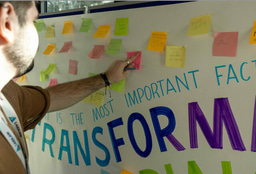
![[CLOSED] Apply to Become an Advisory Board Member](https://images.zapnito.com/cdn-cgi/image/metadata=copyright,format=auto,quality=95,width=256,height=256,fit=scale-down/https://images.zapnito.com/users/290982/posters/b494a8a5-ced0-489b-9b26-6c4da797bedf_medium.jpeg)


Please sign in
If you are a registered user on Laidlaw Scholars Network, please sign in